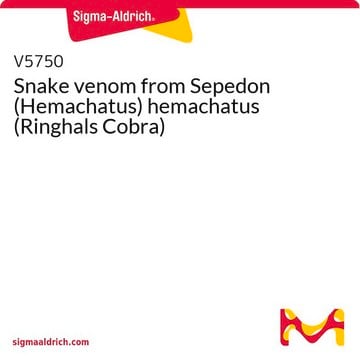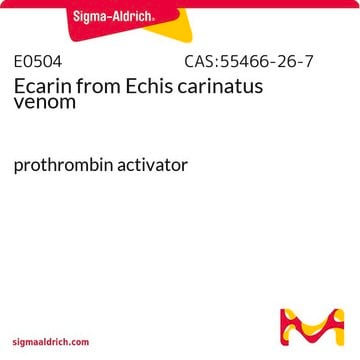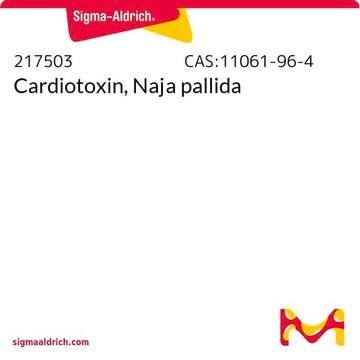V2501
Snake venom from Vipera russelli (Russell′s Viper)
Sign Into View Organizational & Contract Pricing
All Photos(1)
About This Item
UNSPSC Code:
12352202
Recommended Products
storage temp.
−20°C
Quality Level
Application
Snake venom from Vipera russelli (Russell′s Viper) has also been used as a positive control in indirect and sandwich enzyme-linked immunosorbent assay (ELISA) to study the performance of the immunochromatographic test (ICT)-Viper in venom detection in vitro and the detection of clinical envenoming, respectively.
Snake venom from Vipera russelli (Russell′s Viper) has been used for extraction of coagulant protein for complex generation with bovine X factor.
Biochem/physiol Actions
Snake venom can impose death on humans and animals. Nevertheless, snake venom also exhibits anti-bacterial and wound healing properties. Therefore, it is used as a therapeutic for treating various diseases including thrombosis, arthritis, and cancer.
Snake venom from Russell′s Viper is rich in toxins and proteinase inhibitors. The receptor from Vipera russelli β-RTX, interacts with monoamines and opiate and prevents their interaction with native receptors. The proteases from Russell′s Viper mediate coagulation in human plasma. The neurotoxicity of the venom is contributed by phospholipases.
Storage Class Code
11 - Combustible Solids
WGK
WGK 3
Flash Point(F)
Not applicable
Flash Point(C)
Not applicable
Personal Protective Equipment
dust mask type N95 (US), Eyeshields, Gloves
Certificates of Analysis (COA)
Search for Certificates of Analysis (COA) by entering the products Lot/Batch Number. Lot and Batch Numbers can be found on a product’s label following the words ‘Lot’ or ‘Batch’.
Already Own This Product?
Find documentation for the products that you have recently purchased in the Document Library.
Coagulation factor X activating enzyme from Russell's viper venom (RVV-X). A novel metalloproteinase with disintegrin (platelet aggregation inhibitor)-like and C-type lectin-like domains.
Takeya H, et al.
The Journal of Biological Chemistry, 267(20), 14109-14117 (1992)
Snake Venom Proteinase Inhibitors: II. Chemical Structure of Inhibitor II Isolated from the Venom of Russell's viper (Vipera russelli)
TAKAHASHI H, et al.
Journal of Biochemistry, 76(4), 721-733 (1974)
Interaction of lanthanide ions with bovine factor X and their use in the affinity chromatography of the venom coagulant protein of Vipera russelli.
Furie BC and Furie B
The Journal of Biological Chemistry, 250(2), 601-608 (1975)
Sanjoy Kumar Pal et al.
Indian journal of experimental biology, 40(12), 1353-1358 (2003-09-17)
Snake bite injuries and death are socio-medical problems of considerable magnitude. In India a large number of people suffer and die every year due to snake venom poisoning. Snake venom, though greatly feared, is a natural biological resource, containing several
Snake venom proteins: development into antimicrobial and wound healing agents
PerumalSamy R, et al.
Mini-Reviews in Organic Chemistry, 11(1), 4-14 (2014)
Our team of scientists has experience in all areas of research including Life Science, Material Science, Chemical Synthesis, Chromatography, Analytical and many others.
Contact Technical Service






